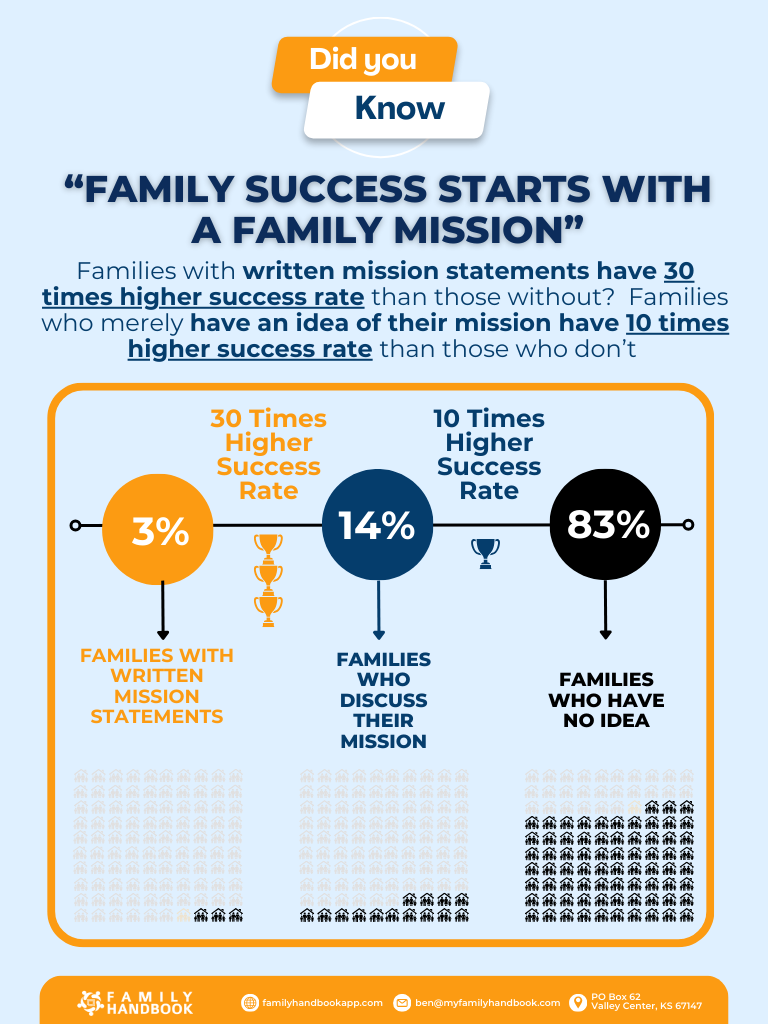
The Power of Having a Family Mission Statement
Transform Your Family Story into a Legacy: The Power of a Family Handbook
Every family holds a story that's uniquely theirs, filled with cherished traditions, values, and a mission that defines who they are. Imagine channeling that rich tapestry of experiences into a Family Handbook — a resource that not only preserves your family's legacy but also strengthens your collective identity. This handbook can become a beacon of family values, fostering teamwork in families and nurturing a sense of belonging among all members. As you articulate your family mission and outline traditions, you'll find it's not just an internal guide but a way to communicate your family's unique story to the world. Like a trusted friend, this blog will guide you in crafting a Family Handbook that builds your family identity and fortifies connections with your community.
Crafting Your Family Handbook
Creating a Family Handbook is a powerful way to capture your family's essence and guide future generations. Let's explore how to define your family's mission and articulate your core values.
Defining Your Family Mission
A family mission statement is the cornerstone of your Family Handbook. It's a concise declaration of your family's purpose and goals.
Start by gathering your family members and discussing what matters most to you collectively. Consider your shared aspirations, beliefs, and the impact you want to make in the world.
Next, draft a statement that captures these ideas. Keep it short, clear, and inspiring. For example: "Our family strives to support each other's growth, contribute positively to our community, and find joy in life's simple moments."
Remember, your mission can evolve over time. Family-ID offers great resources for refining your family mission statement.
Articulating Core Family Values
Core family values are the principles that guide your family's decisions and behaviors. They're the bedrock of your family culture.
Begin by brainstorming values that resonate with your family. These might include honesty, compassion, perseverance, or creativity. Aim for 5-7 key values that truly define your family. (Our step-by-step process on www.myfamilyhandbook.com allows you to first choose your top 10 core values as a family and then helps you narrow down to just your top 5. It also creates your customized and designed Family Core Values Statement for you to download immediately.)
For each value, write a brief explanation of what it means to your family. This helps ensure everyone understands and can apply these values in daily life.
Consider creating a visual representation of your values, like a family crest or a word cloud. This can be a powerful reminder and a great addition to your Family Handbook.
Flourishing Family also provides excellent exercises for identifying and articulating family values.
Enhancing Teamwork in Families
A Family Handbook can be a powerful tool for promoting teamwork and cooperation within your family unit. Let's explore how to foster these qualities and build a strong family identity.
Fostering Cooperation and Support
Cooperation and mutual support are vital for a harmonious family life. Your Family Handbook can outline strategies to enhance these qualities.
Establish clear roles and responsibilities for each family member. This creates a sense of purpose and contribution. For example, assign age-appropriate chores or family project roles.
Encourage open communication by setting guidelines for family meetings. These can be weekly check-ins where everyone shares their thoughts and feelings.
Create a system for conflict resolution. This might include steps like: 1. Express feelings calmly, 2. Listen without interrupting, 3. Brainstorm solutions together, 4. Agree on a plan.
Big Life Journal offers great activities to foster cooperation and support in families.
Building Family Identity Through Traditions
Family traditions play a crucial role in building a strong family identity. They create shared experiences and memories that bind family members together.
In your Family Handbook, document your existing traditions and their significance. This might include annual vacations, holiday rituals, or weekly family game nights.
Consider creating new traditions that align with your family values. For example, if community service is important to you, establish a monthly volunteer day.
Don't forget to include everyday rituals too, like bedtime stories or Sunday brunches. These small, consistent actions often have the most impact on family cohesion.
Up Faith and Family provides great insights on creating meaningful family traditions.

Sharing Your Family's Unique Story
Your Family Handbook isn't just for internal use; it's also a powerful tool for sharing your family's unique story with the world. Let's explore how to effectively communicate your family's ethos and strengthen community connections.
Communicating Your Family's Ethos
Your family's ethos is the character and spirit that defines you. It's shaped by your values, traditions, and shared experiences.
Use your Family Handbook to articulate this ethos clearly. Include stories that illustrate your family's character in action. For example, share anecdotes of how your family has lived out its values in challenging times.
Consider creating a family motto or slogan that encapsulates your ethos. This can be a powerful, concise way to communicate who you are as a family.
Don't shy away from sharing your family's aspirations and goals. This shows that your family is forward-thinking and committed to growth.

Strengthening Community Connections
Your Family Handbook can be a powerful tool for connecting with your broader community and leaving a lasting legacy.
Use it to outline your family's approach to community involvement. This might include regular volunteer activities, participation in local events, or support for specific causes.
Consider sharing parts of your Family Handbook with close friends or extended family. This can deepen relationships and inspire others to create their own family legacies.
Document how your family navigates cultural or generational differences. This can provide valuable insights for others facing similar challenges.
Quora offers interesting perspectives on preserving family values in a changing world, which can enrich your handbook.

